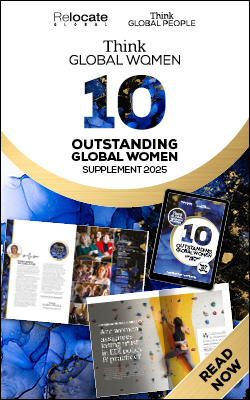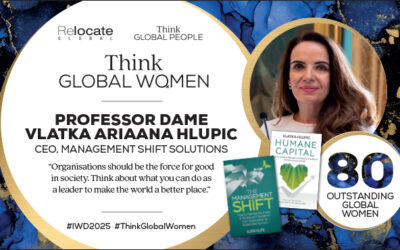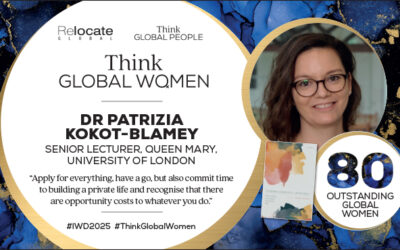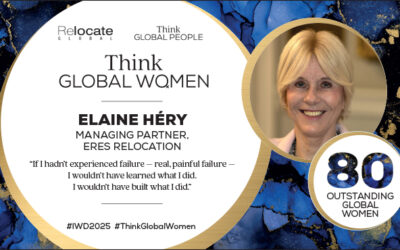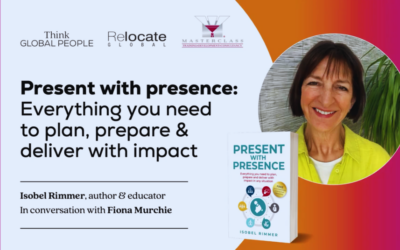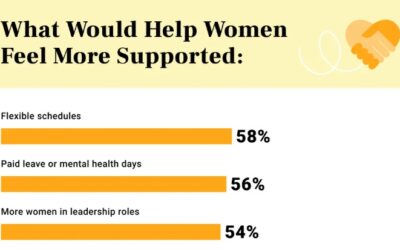Think Global Women
Irina Yakimenko | 80 Outstanding Global Women 2025
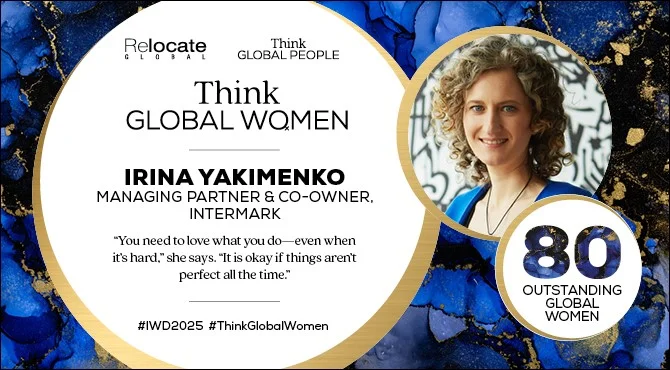
“The past few years have been a whirlwind—geopolitical tensions, economic upheavals, and a pandemic that reshaped the world,” she says. “These challenges don’t just make headlines; they are the reality we have to deal with on a daily basis.”
When thinking back to the start of her career journey, she could never have predicted the sheer complexity of what moving people across borders would mean today. The landscape of relocation has shifted dramatically, not just because of changing policies but because of the world itself—its conflicts and tensions that still dictate so much of daily life.
“I believe that women must learn to navigate the constant sense of guilt—whether it is mum guilt, career guilt, or the pressure to meet others’ expectations. We need to be kinder to ourselves and acknowledge that our journeys will be different from those of men, and even from each other.”
Irina Yakimenko
“I grew up in the Soviet Union and as a child, remember seeing a long queue outside a shop, not knowing what was being sold, but instinctively joining it because if people were lining up, it meant something was available.
“I must have stood there for two hours before my older sister showed up, and we finally discovered we were queuing for tights,” she says. “Our mother was unimpressed, but we were thrilled. It felt normal to us: we played outside, we adapted to whatever was happening.”
For a brief window in the 1990s, there was a sense of real democracy in Russia—a time when everything felt possible. And then, just as quickly, it disappeared.
Seeking to expand her horizons, Irina studied at university in Moscow, then spent two years in Sweden, some time in Israel, and then moved back and forth between Moscow and other places. Her background is in languages and cross-cultural training, and her mother was part of the first Peace March between the US and the Soviet Union in the late 1980s. Back then, it was still the USSR, and she joined the group as a translator, the only one in her area who spoke English. Being part of a Jewish Ukrainian family in Moscow meant existing between cultures.
“As a child, that experience brought American friends into our home—something that, in Soviet Moscow, did not go unnoticed. Police would come by, questioning why we had foreigners in our house.”
Upheaval and relocation during the Ukraine war
In 2022, Irina was living and working in Moscow, managing Intermark, when the war with Ukraine began.
“Ten days into the invasion, we left,” she says. “We had no idea if we’d ever come back. I was certain we had to leave, but the act of doing it felt unreal.
“Leaving wasn’t easy. I grew up studying Jewish history, learning about the Holocaust, about the warnings that people didn’t—or couldn’t—act on. As a child, I remember feeling angry. “They saw it coming,” I thought. “Why didn’t they leave?” And then, in 2022, when war broke out, I finally understood. Because leaving is brutal. Because why should you leave your country, your home, your business, your life? My sister stayed. Many of my friends stayed. And I respect them for it. But for me, there was no other choice.”
She and her immediate family left Moscow with no clear destination. The only flight she could book was to Istanbul. From there, she planned to go to Israel, but eventually chose to settle in the UK, where Intermark already had a legal entity and operations. Through all of this, she was continuing to run the business, relocating and evacuating Intermark employees as well as clients.
“We were moving staff out of Ukraine, out of Russia. Our teams in both countries had to work together under impossible circumstances. We were running emergency webinars for clients, trying to help them understand the rapidly changing situation. We were chartering planes to evacuate people from Russia, organising transport to get people across the Polish border from Ukraine, booking housing for families who had nowhere to go.
“Our own team needed support, too. We told them: if you need to leave, we’ll help you, just as we’re helping our clients. We had staff relocating to Armenia, Kazakhstan, Serbia, Bulgaria—wherever they could go. Today, we still have team members in Ukraine, but the war forced us to reinvent our business. Russia was our main market—it made up 65% of our operations. And then, overnight, it disappeared and we had to rebuild from scratch. We still had our expertise, our people and our infrastructure. So we pivoted to Eastern Europe—Serbia, Poland, Romania, Bulgaria. We expanded into new markets and started new services.”
At the same time, Irina and her business partner, Marina, had been running the company for 20 years, but they had external shareholders who didn’t share the vision for the future.
“Negotiating with them was one of the hardest things we’ve ever done, but at the end of last year, we bought them out. Now, we are a fully women-owned, women-run company, and looking forward to the future,” she says.
Developing new products and new markets
Irina worked for NGOs for many years before working in the Global Mobility industry, so she has lots of experience handling cross-cultural conversations. Intermark Relocation now provides a full range of immigration, relocation, moving, legal and outbound services to major international companies and individuals to and from locations across Eastern Europe and worldwide. It recently moved its company headquarters to Belgrade, Serbia, and expanded its footprint and local expertise throughout Eastern Europe.
“Expanding into Eastern Europe, we encountered a unique set of hurdles—ones that aren’t often discussed in boardrooms but shape people’s lives in profound ways,” she says. “Moving people into Poland, the Czech Republic, or the Baltic States carries a lot of historical baggage and can affect immigration policies, how documents are processed, and even in the reluctance of landlords to rent to certain nationalities.
“It is something we have to navigate delicately, because it is not just paperwork—it is people’s lives, their identities, and often, wounds that haven’t fully healed. Even something as simple as designing an office map becomes difficult. We operate in 22 countries, but creating a map that is legally and politically acceptable in all of them is impossible.”
Housing, too, presents unexpected challenges. In developed Eastern European cities like Prague or Warsaw, the issue is not quality but availability. A surge of migration from Russia and Ukraine has taken up a lot of the housing stock. In places like Bulgaria or Serbia, clients’ expectations often need to be managed, because the standard is often very different from what they imagined.
In response to the increasing demands of its clients and partners, Intermark Relocation has launched Intermark Homes, a corporate housing service. This service offers customised and thoroughly vetted global living accommodations tailored to a client’s needs and budget. Intermark Homes manages an extensive portfolio of properties worldwide, serving corporate relocations, expatriate families, and business travellers, and one of Intermark’s fastest-growing services is household goods relocation.
“We quickly realised it is deeply personal. Moving is not just about transporting belongings—it is about making people feel at home,” Irina says. “We are often dealing with very stressed people, and the small details and the human touch can transform a difficult experience into a manageable one.”
Intermark’s expansion into new markets is accelerating. Internally Irina focussed on training the team, ensuring that whether someone is handling immigration, home finding, or logistics, they understand what the assignee is going through at every step.
“Poland used to be preferred destination for companies setting up operations in Eastern Europe, but costs are rising. Now, firms are looking at places like Romania and Serbia—markets that were once overlooked but are now attracting serious investment.”
Rising mortgage costs mean even local residents are renting more, reducing availability. In less developed regions like Romania, Bulgaria, and Serbia, fewer housing options exist, although investment in these countries is increasing due to lower living and business costs, attracting companies that previously overlooked these markets.
Larger companies are heading up the expansion into these regions, seeking unsaturated markets. Many are establishing back-office operations in countries like Romania and Bulgaria, as Poland becomes more expensive. Joint government projects also play a role. While some retail companies move hundreds of employees for projects, these relocations are temporary and do not tend to indicate a stable market trend.
The importance of an inclusive leadership style
Irina’s journey into global mobility was shaped by her deep interest in different cultures. Studying Jewish culture and philosophy in Sweden introduced her to a diverse, interfaith environment that she longed to recreate when I returned to Moscow. Initially, she worked on organising international educational conferences, which eventually led her to an unexpected opportunity at Intermark.
“During my interview, the HR representative initially told me I was overqualified for the role,” she explains. “That only fuelled my determination—I wasn’t ready to take no for an answer. I asked to speak with someone else, and that conversation led to the creation of a role that didn’t exist before: providing support services for international families living in Moscow. At the time, relocation wasn’t a core part of the business, but that opportunity became the foundation for what my business partner Marina and I would build in the years to come.”
She says the field of global mobility is constantly evolving, shaped by geopolitical shifts and technological advancements. It is a challenging industry because it revolves around people—often people under immense stress due to relocations.
“People who work in this industry tend to be deeply empathetic and resilient,” she says. “It attracts a certain kind of person—someone who can navigate emotional complexities while finding creative solutions. Once you’re in, it is hard to leave.”
Irina believes in fostering a workplace that aligns with the principles of integrity and openness.
“We have built a horizontal structure where anyone can contribute ideas,” she says. “This openness has led to incredible innovations—some team members have developed projects that have grown into major services. This kind of collaborative, dynamic environment is what keeps us strong through challenges.
“Over the years, we have faced difficult situations, and in those moments, I have always turned back to my values. They serve as a compass, helping me make decisions that, even if not perfect, allow me to feel whole and aligned with my purpose. Feminism, for me, is deeply personal—it stems from my upbringing and influences how I raise my son. I firmly believe that raising boys with a feminist perspective is just as crucial as empowering women.
“At our company, we strive to create a truly inclusive environment. While discussions around gender diversity and inclusion have become more mainstream, in some regions where we operate, such as Russia and Central Asia, these concepts remain challenging. We have employees who can only be themselves within the safe space of our offices, and that is a responsibility we take seriously. Our goal is to support our teams in becoming more assertive and open, cultivating a culture that attracts passionate and driven individuals.”
Advice for women in international careers
For women looking to build a career in global mobility—or any international field—Irina’s advice is simple: don’t give up. This industry can be tough, but it is also incredibly rewarding. If you are passionate about something, pursue it, even when the path is not always clear.
“I also believe that women, in particular, must learn to navigate the constant sense of guilt—whether it is mum guilt, career guilt, or the pressure to meet others’ expectations,” she says. “We need to be kinder to ourselves and acknowledge that our journeys will be different from those of men, and even from each other.
“For young women starting their careers, my biggest piece of advice is to invest in knowing yourself. Throughout my journey, I sought out training, coaching, and mentorship because I was eager to learn and grow. Finding clarity on your values and inner motivations is crucial, especially when external pressures try to steer you in different directions.
“And finally, surround yourself with the right people. I was fortunate to have a business partner, Marina, with whom I navigated the challenges of building our company. Having someone to support you during tough times—and to keep you grounded —makes all the difference. The same applies to your personal life; your circle of friends, family, and mentors will shape your journey just as much as your own determination.”
Irina is passionate about Jewish culture and tradition, interfaith dialogue, feminism, and equal rights. She is an Executive Board Member of EuRA, the professional industry body for relocation providers.
For her, relocation and global mobility are not just a job, but a passion. It is role that requires resilience, self-compassion, and a deep understanding of the client’s needs and expectations.
“You need to love what you do—even when it’s hard,” she says. “It is okay if things aren’t perfect all the time. What matters is finding work that fulfils you and doing your best.”

